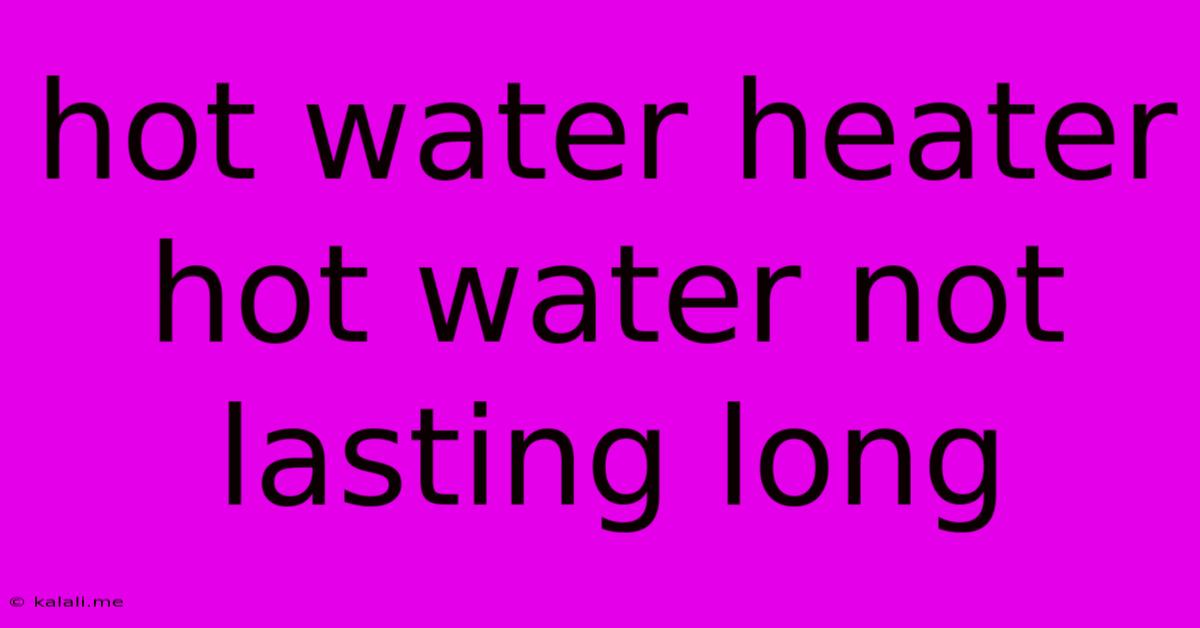Hot Water Heater Hot Water Not Lasting Long
Kalali
May 24, 2025 · 4 min read

Table of Contents
Hot Water Heater Hot Water Not Lasting Long: Troubleshooting and Solutions
Is your hot water running out too quickly? A dwindling supply of hot water can be incredibly frustrating, disrupting your daily routine and leaving you shivering in the shower. This article will guide you through the common causes of this problem, offering practical troubleshooting steps and potential solutions to get your hot water flowing freely again. We'll cover everything from simple checks to more complex issues, ensuring you can diagnose and fix the problem efficiently.
Understanding Your Hot Water Heater's Capacity
Before diving into troubleshooting, it's crucial to understand your hot water heater's capacity. Most standard residential heaters range from 30 to 50 gallons. A family of four might deplete a 40-gallon tank faster than a single person living alone. Consider your household size and typical hot water usage patterns. If your hot water runs out surprisingly fast, even considering your household size, there's likely a problem that needs addressing.
Common Causes of Short Hot Water Supply
Several factors can contribute to your hot water running out prematurely. Let's explore some of the most frequent culprits:
1. Leaky Faucets and Fixtures: Dripping faucets and leaky showerheads might seem insignificant, but they steadily drain your hot water tank over time. Even a small leak can significantly impact your hot water supply, leading to it running out much sooner than expected. Check all faucets and showerheads for leaks, repairing or replacing them as needed. This is often the simplest and most overlooked solution.
2. Increased Water Usage: Have you recently added new water-intensive appliances, like a dishwasher or washing machine? Increased household size or changes in water usage habits can also contribute to depleting your hot water supply faster. Evaluate your water usage and consider ways to conserve hot water, such as shorter showers or using cold water for laundry pre-soaks.
3. Sediment Buildup: Over time, sediment accumulates at the bottom of your hot water tank. This sediment acts as an insulator, reducing the tank's efficiency and causing the water to heat more slowly, leading to lower water volume and quicker depletion. Flushing your hot water tank regularly (at least once a year) can remove this sediment and improve efficiency.
4. Faulty Dip Tube: The dip tube is a plastic pipe inside your hot water tank that directs cold water to the bottom. If it cracks or breaks, cold water will mix with hot water, resulting in less hot water and potentially lukewarm showers. This often requires professional assistance to replace the dip tube.
5. Thermostat Issues: A malfunctioning thermostat may not be heating the water to the correct temperature or may be cycling on and off incorrectly. This can lead to inconsistent hot water temperature and faster depletion of the hot water supply. Consider professional assessment and potential repair or replacement of your water heater thermostat.
6. Element Failure (Electric Water Heaters): Electric water heaters have heating elements that can fail over time. A faulty heating element may not heat the water efficiently or at all, leading to reduced hot water availability. A qualified technician should check and replace the heating element as needed.
7. Anode Rod Degradation (Gas and Electric Water Heaters): The anode rod protects your tank from corrosion. As it degrades, it can affect the tank's efficiency and potentially lead to faster hot water depletion. Inspecting and replacing this rod when necessary can significantly improve your hot water heater's lifespan and efficiency.
8. The Water Heater Itself is Too Small: If all else fails, your water heater may simply be too small for your household's needs. Consider upgrading to a larger capacity water heater to meet the demand.
Troubleshooting Steps
- Check for Leaks: Begin by carefully inspecting all faucets and fixtures for leaks.
- Assess Water Usage: Analyze your household's water consumption patterns.
- Flush the Tank: Regularly flushing your tank removes sediment buildup.
- Inspect the Dip Tube: Examine the dip tube for cracks or damage (requires access to the tank).
- Check the Thermostat: Verify that the thermostat is set correctly and functioning properly.
- Consider Professional Help: If the problem persists, consult a qualified plumber or appliance repair technician.
By systematically addressing these potential causes, you'll be well on your way to restoring a consistent supply of hot water to your home. Remember, preventative maintenance is key to prolonging the life of your hot water heater and avoiding costly repairs.
Latest Posts
Latest Posts
-
How To Open Wine Bottle Without Corkscrew
May 24, 2025
-
How To Find The Period Of A Function
May 24, 2025
-
How To Find Period Of A Function
May 24, 2025
-
How To Say Nice To Meet You In Spanish
May 24, 2025
-
How To Change A Light Switch
May 24, 2025
Related Post
Thank you for visiting our website which covers about Hot Water Heater Hot Water Not Lasting Long . We hope the information provided has been useful to you. Feel free to contact us if you have any questions or need further assistance. See you next time and don't miss to bookmark.